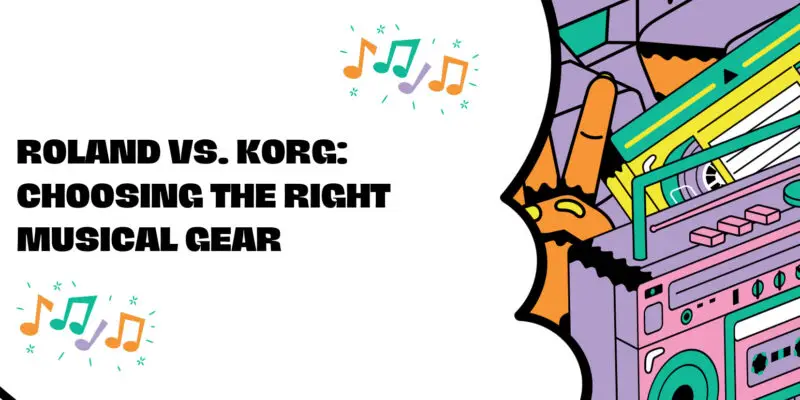When it comes to choosing musical instruments and equipment, two names that frequently stand out are Roland and Korg. Both companies have a rich history of producing innovative and high-quality musical gear, ranging from synthesizers to digital pianos, drum machines, and more. In this comprehensive article, we’ll explore the strengths and differences between Roland and Korg to help you make an informed decision based on your musical needs and preferences.
Company Background:
- Roland Corporation:
- Founded in Osaka, Japan, in 1972, Roland is a pioneer in electronic musical instruments.
- Known for groundbreaking inventions like the TR-808 drum machine, TB-303 bass synthesizer, and iconic synthesizers like the Juno and Jupiter series.
- A reputation for quality and innovation, with a wide range of products for both professionals and enthusiasts.
- Korg Inc.:
- Founded in Tokyo, Japan, in 1963, Korg has a long history of producing innovative electronic musical instruments.
- Renowned for products like the Korg MS-20 analog synthesizer, M1 workstation, and Triton series.
- Recognized for its commitment to user-friendly interfaces and sound quality.
Sound Quality and Synthesis Capabilities:
- Roland:
- Roland is known for its warm and rich analog sound as well as its cutting-edge digital synthesis technologies.
- The Jupiter, Juno, and Boutique series have become iconic for their classic and evolving sound character.
- Roland’s SuperNATURAL technology provides authentic and expressive acoustic instrument emulations.
- Korg:
- Korg synthesizers offer a wide sonic palette, from classic analog tones to modern digital textures.
- The Korg MS-20, with its aggressive analog sound, and the M1, known for its extensive sample-based sounds, are standout models.
- Korg’s Wavestation and Kronos series showcase their prowess in digital synthesis and sound design.
Instrument Categories:
- Roland:
- Roland produces a diverse range of instruments, including synthesizers, digital pianos, electronic drums, and guitar effects processors.
- Instruments like the Roland FA series and RD digital pianos are favored by professionals and live performers.
- Korg:
- Korg offers a wide variety of products, including synthesizers, digital pianos, arranger keyboards, and effects processors.
- Korg’s Kronos workstation and Krome series are popular among composers and live musicians.
Ease of Use and Interface:
- Roland:
- Roland instruments are often praised for their user-friendly interfaces and intuitive controls, making them accessible to musicians of all levels.
- The ACB (Analog Circuit Behavior) technology used in their digital synthesizers closely emulates the feel of analog controls.
- Korg:
- Korg instruments are designed with user-friendliness in mind, providing straightforward interfaces that encourage quick sound shaping and experimentation.
- The touchscreen interfaces on some Korg products enhance ease of use and navigation.
Innovation and Technological Advancements:
- Roland:
- Roland has a history of pioneering new technologies, such as the V-Drums, V-Piano, and the AIRA series of digital instruments.
- The company continues to innovate with products like the Roland Zen-Core synthesis engine.
- Korg:
- Korg is known for pushing the boundaries of technology with products like the Korg Wavestate, a reimagining of their classic Wavestation, and the Volca series of compact, affordable synthesizers.
Price Range:
- Roland:
- Roland offers a wide price range, from entry-level instruments suitable for beginners to high-end professional gear.
- The Boutique series and GO:KEYS are budget-friendly options, while the Jupiter and RD series cater to professionals.
- Korg:
- Korg similarly provides instruments across various price points, ensuring options for musicians of all budgets.
- The Volca series and Korg EK series offer affordable choices, while the Kronos and pro-level synthesizers are aimed at advanced users.
Conclusion:
In the Roland vs. Korg debate, the choice largely depends on your musical preferences, goals, and budget. Both companies have a legacy of producing exceptional instruments with their unique characteristics. Roland is known for its classic analog sound and innovative technologies, while Korg is celebrated for its versatile sonic palette and user-friendly interfaces. Ultimately, it’s essential to consider your specific needs and the sound you want to achieve when deciding between Roland and Korg, as both companies offer a wealth of options to suit a wide range of musical styles and aspirations.


